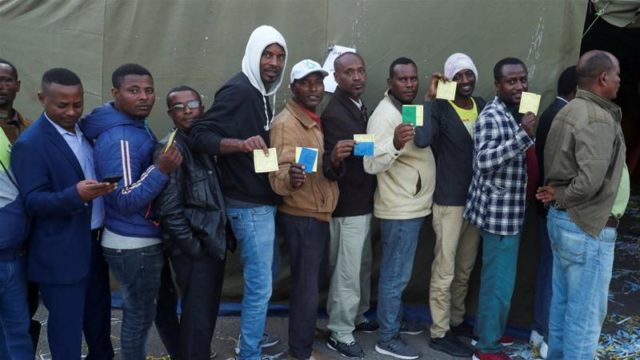People in southern Ethiopia’s Sidama region are voting in a referendum on whether to create a new regional state along ethnic lines. Polls opened at 6am (03:00 GMT) on Wednesday and will close at 6pm (15:00 GMT). Preliminary results are expected on Thursday.
The Sidama drive for statehood, which goes back decades, triggered days of deadly clashes in July between activists and security forces after the activists threatened to unilaterally declare a new regional state. The unrest prompted the government to place Ethiopia’s Southern Nations, Nationalities, and Peoples’ Region (SNNPR) under the control of soldiers and federal police.
If the referendum passes as expected, the Sidama will control local taxes, education, security and laws in a new self-governing region.
Several other groups in the south of the country have already launched plans for self-determination similar to that of the Sidama, who make up about four percent of Ethiopia’s more than 100 million people. Some analysts fear the vote could embolden groups with similar demands and unleash further ethnic violence.
“The Sidama referendum will be a big test for Ethiopia’s multinational federalism, on how it can accommodate various self-determination rights and, crucially, what comes after the referendum,” Abebe Aynete, a senior researcher at Ethiopian Foreign Relations Strategic Studies, a local think-tank, told Al Jazeera.
Federal system
On Wednesday morning, the mood in the regional capital, Hawassa, appeared calm as people formed long queues at polling stations at dawn. Overall, some 2.3 million people have registered to vote.
Away from the polling stations, the streets of Hawassa were much quieter than usual, with Wednesday declared a holiday for the vote. Heavily armed police and soldiers patrolled the streets.
“The voting process is inclusive, smooth, transparent and exciting,” Fantahun Hatiso told AFP news agency after casting his ballot.
“I voted for a decision that I believe will work towards development, peace and personal wellbeing.”
The referendum on autonomy springs from a federal system designed to provide widespread ethnic self-rule in a hugely diverse country, Africa’s second-most populous. At present, Ethiopia is partitioned into nine semi-autonomous regional states – with the Sidama voting for a potential tenth.
The constitution requires the government to organise a referendum for any ethnic group that wants to form a new entity. The dormant Sidama campaign gained fresh momentum after Prime Minister Abiy Ahmed, winner of this year’s Nobel Peace Prize, took office in 2018 and began introducing a series of political reforms.
“I consider witnessing this day as if I was borne again,” Yerusalem Kabiso, who lost her 24-year-old brother in the July clashes, told Reuters news agency.
“We lived our whole life under oppression, as a child I remember chopped heads of Sidama people displayed at the market, I will never forget the head of my brother in law.”

























